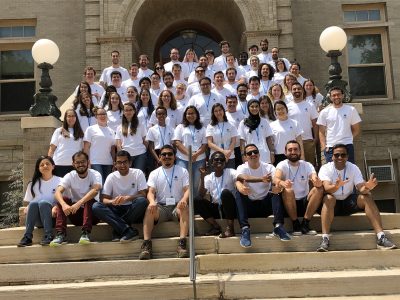
Cristian Aviles-Martin, a rising 3rd year PhD student of the Pinkhassik Lab and active member of the Joint Safety Team in the Department of Chemistry, attended the American Chemical Society’s (ACS) Summer School on Green Chemistry and Sustainable Energy held during the week of July 16, 2019 at the Colorado School of Mines in Golden, CO. He shares his experience below.
Throughout this event, graduate students and postdocs participated in lectures and workshops that provided a wide variety of opportunities to learn and apply skills dealing with safer, more sustainable, and environmentally friendlier practices in chemistry and engineering. The program’s location provided an excellent environment for collaboration and learning. Furthermore, while the program involved a great deal of time in lecture halls, most of the talks and lectures had an interactive component that involved active problem solving and discussion.
One of the biggest components of the program was the “Choosing the Greenest Synthesis” workshop led by Philip Jessop of Queen’s University in Canada. In this workshop, Dr. Jessop led the groups through the process of performing a Life Cycle Analysis (LCA) on chemical syntheses. Through LCA, the impact a chemical process has on the environment is determined by considering multiple variables such as smog formation, toxicity, and persistence in the environment. The exercise encouraged collaboration among participants inside and outside of lecture, and was effective in demonstrating the complexity and vast number of considerations that must be taken when determining environmental impact.
While this program was rigorously scheduled, it was not all work and no play. Halfway through the program there was a rafting trip with Clear Creek Rafting in Idaho Springs, CO. In between all the discussion on sustainable chemical practices and discussions of endangered precious metals, the rafting trip was a much-needed break and opportunity to relax. Additionally, since the trip took place in the morning, the afternoon could be used to explore the town of Golden. I explored Main Street and learned a bit about the history of the town. This day gave the program a breath of fresh air that helped all the participants gain a second wind to finish the last half of the summer school.
This program not only dealt with green chemistry and sustainability, but it also gave participants a perspective on the reality that we face with sustainable energy. For example, we are not moving away from fossil fuels anytime soon, but we can develop smarter ways to use them, such as moving towards more efficient uses of natural gas. Overall, I believe the ACS Summer School on Green Chemistry and Sustainable Energy was an indispensable experience and resource for me as a chemist, as well as an opportunity to build my network with other chemists throughout North and South America.
Note: The ACS Summer School on Green Chemistry and Sustainable Energy is conducted annually by the Petroleum Research Fund and the ACS Green Chemistry Institute. Transportation, shared on-campus housing, meals, and program costs are provided free of charge to participants. Applications are typically due in January each year.
More information can be found at: https://www.acs.org/content/acs/en/greenchemistry/students-educators/summerschool.html
For more information about the Department of Chemistry Joint Safety Team, click here.